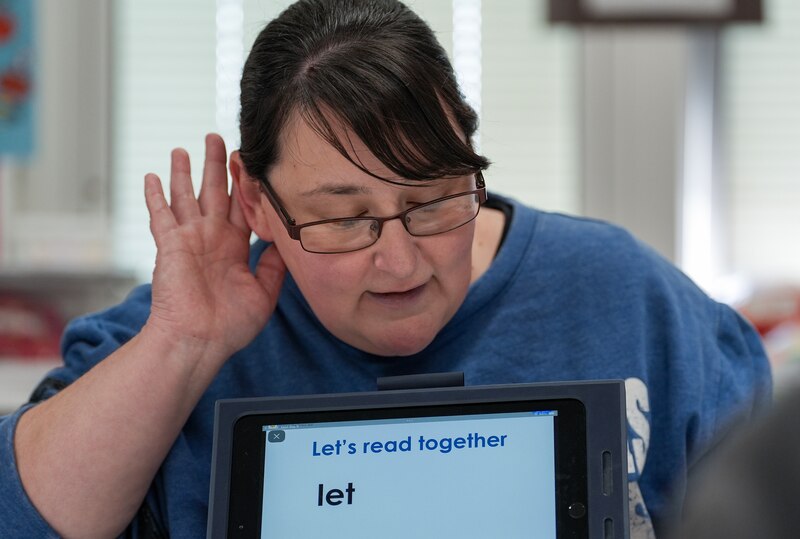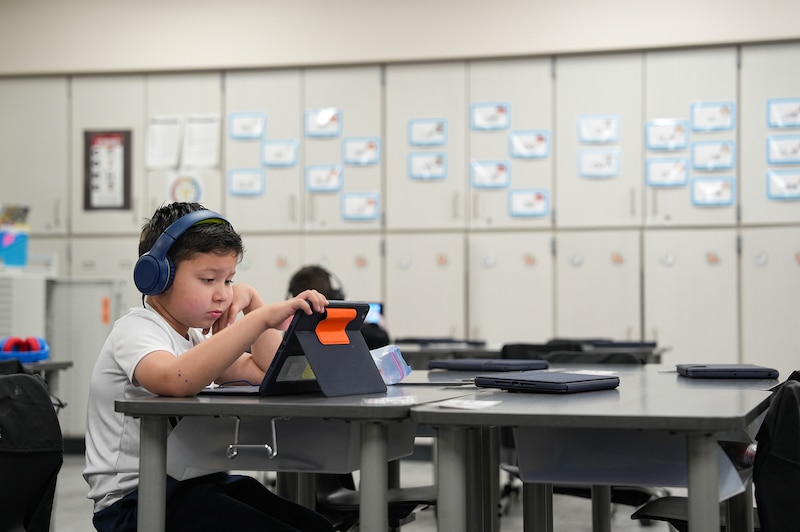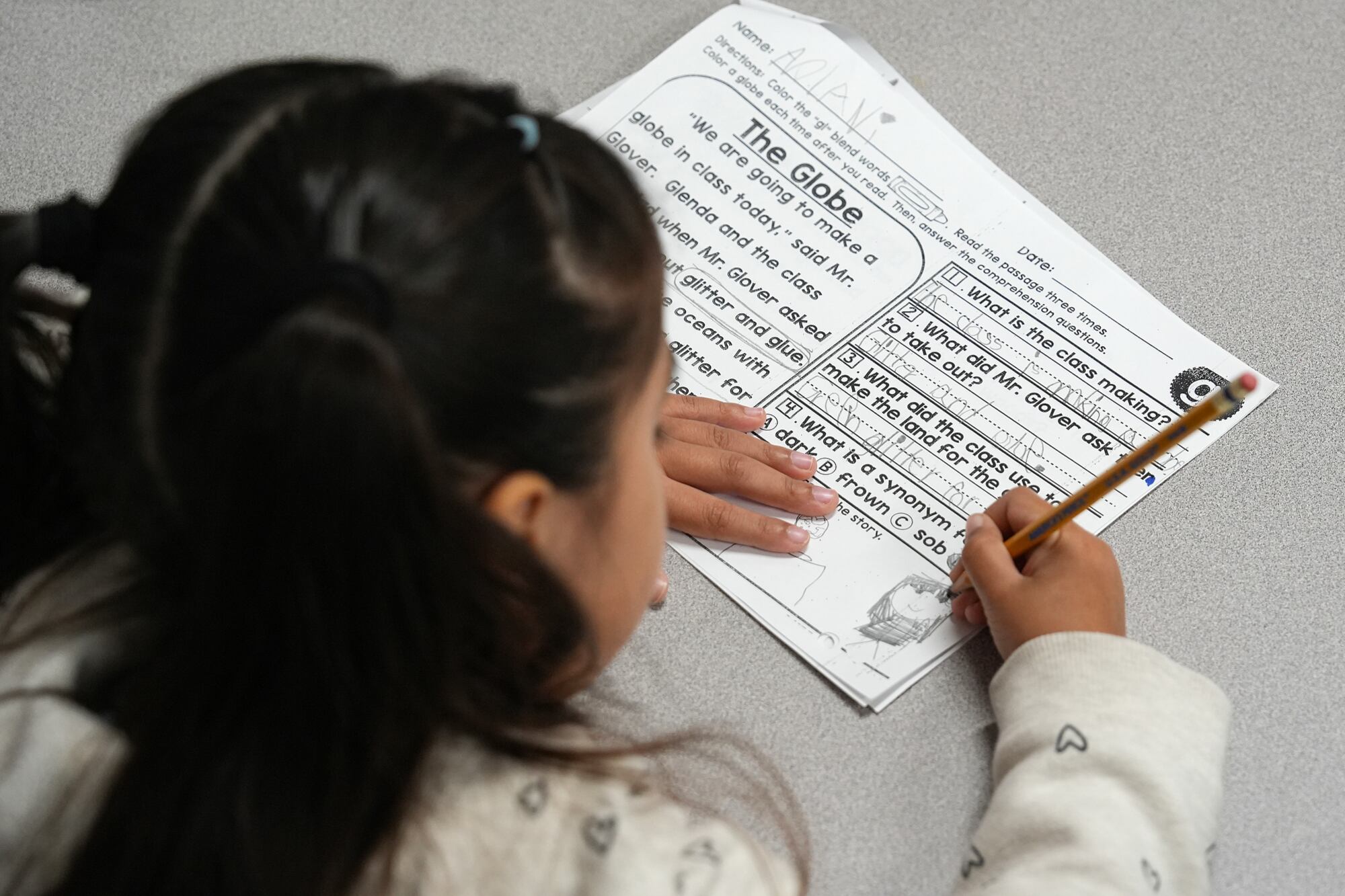Sign up for Chalkbeat Indiana’s free daily newsletter to keep up with Indianapolis Public Schools, Marion County’s township districts, and statewide education news.
This article was originally published by Mirror Indy.
Every corner of the first grade wing at Pleasant Run Elementary comes alive during small-group reading time.
Teachers and instructional assistants steer colorful carts loaded with workbooks and binders up and down the hall as students break up into small groups for a half hour several times a day. Students are seated in semi-circles around their teachers or on colorful carpets at the front of a classroom or tucked to the side in the hallway.
Breaking up into small groups — into what looks like a sort of organized chaos — allows students to focus on learning reading and writing skills adjusted to their individual needs. For the Warren Township elementary school, the all-hands-on-deck approach to literacy has helped drive a turnaround on the state’s third grade reading exam, called IREAD, at a time when state officials are laser-focused on improving Hoosier students’ reading skills.
“Every kid is seen in a small group every day by an adult in this building,” Pleasant Run instructional coach Megan Reyes said. “That has made a huge impact on student growth.”
Last year, only about 60% of Pleasant Run students passed IREAD. But this year, the scores jumped 21.5 percentage points — one of the greatest improvements across the state, putting the school up to par with the rest of Indiana students who passed the test at a rate of just over 82% this year.
And, Pleasant Run students are defying the odds. About one in three students are English language learners and more than 80% identified as coming from low-income backgrounds last school year. National trends show students in these groups are statistically more likely to struggle with standardized exams. But, at Pleasant Run, all demographics showed growth this year.
“It was great to see that our efforts have paid off,” Principal Travis Koomler said, “and we were able to put the right things in place to better support our kids.”
Pleasant Run’s approaches are practiced in elementary schools across Warren Township. And those schools have seen success, too.
For the first time in the district’s history, students in Warren Township schools collectively surpassed 80% passing in the IREAD exam — making it the only school district in Marion County where test scores were higher than before the pandemic.
Improving student literacy requires comprehensive effort
Students at Pleasant Run participate in a 90-minute literacy block led daily by their classroom teacher plus 30 minutes of writing. Between those regular classroom lessons, students get an additional 30 minutes of small-group instruction tailored to their needs.
Educator teams at Pleasant Run use data collected through assessments and informal checks to pinpoint where students excel and where they need help. Maybe one student needs help with vowel sounds while another is ready to work on short passages.
During small-group instruction time, those students can be paired with peers in their grade to focus on accelerated lessons or to review concepts they need to spend a little more time with.

On one Monday morning in September, first grade teacher Ali Summers used this time to go over letter sounds with four students — sounding out each consonant and vowel or a word before moving onto the next. Students followed along using a custom-made blending board, a tool that helps kids visualize each word as it’s spoken aloud.
Across the room, another five students worked with a bilingual instructional assistant on reading comprehension prompts. As a dual-language immersion school, Pleasant Run has several of these assistants who can help multilingual students build up background knowledge and oral language skills that may come easier to classmates whose first language is English.
A third group — still in the same classroom — studied separately with a different bilingual instructional assistant, and a handful of students scattered across remaining desks worked on vocabulary exercises on their digital tablets.
Pleasant Run administrators say keeping these groups small is key. The school has about a dozen instructional assistants total. And other teachers for related classes — such as gym, art, and STEM — have also been trained and work with students during small-group time to ensure student-to-instructor ratios stay low.
The district also partners with Circle City Readers, a program of the Mayor’s Office of Education Innovation that places paid and trained tutors in Indianapolis schools. For Pleasant Run, the program adds another seven adults to the building during reading intervention time.
All told, students can receive more than two hours of in-school reading and writing time. There’s also after-school tutoring opportunities with provided transportation and worksheets sent home with families.
It’s an all-hands-on-deck effort, administrators say. Ultimately, the goal is to both help kids learn and find joy in reading.
“We’ve seen students really embrace reading because they know how to decode and figure out how to read the words,” Reyes said. “That has increased their desire to read because they can.”
Reading support means involving families too
Pleasant Run first ramped up its support for reading during the early days of the coronavirus pandemic.
Teachers attended a series of virtual trainings as a part of a state program called the Indiana Literacy Cadre which helps teach educators about the science of reading — a method of language arts instruction that emphasizes phonics and reading comprehension.
The state now requires schools to use a science of reading-based curriculum. However, as a part of the state literacy cadre, Pleasant Run adopted the teaching style early.
It’s also just as important, Reyes said, to get families involved.
Last year, her team began sending packets home with students every week familiarizing the kids and their parents with the IREAD test. The school has also had parent meetings to answer questions about the state exam.

That communication has become especially important this year, administrators say, as Indiana rolls out a retention requirement for third graders who do not pass the test.
Pleasant Run administrators say they want parents to understand the importance of helping their students pass the exam on time. Koomler said the school has already identified about 65 students who are at risk of not passing. Those students have been invited to additional after-school tutoring to get ahead of the new requirement.
“Parents have been very supportive,” Koomler said. “They want the best for their child as well and I think they understand the importance of the IREAD test now, so I haven’t had any problems with getting parents on board.”
With this type of support for families in place, Pleasant Run administrators said they weren’t surprised by their school’s recent success on the IREAD exam.
The team is aiming even higher this year with a new goal: 90% passing. That would surpass the school’s 82% pass rate and set another district record.
“The growth that we saw last year has really motivated teachers to keep going,” Reyes said. “They did put in so much work, and because it paid off, I think that just really keeps the momentum going for us.”
Mirror Indy reporter Carley Lanich covers early childhood and K-12 education. Contact her at carley.lanich@mirrorindy.org or follow her on X @carleylanich.





